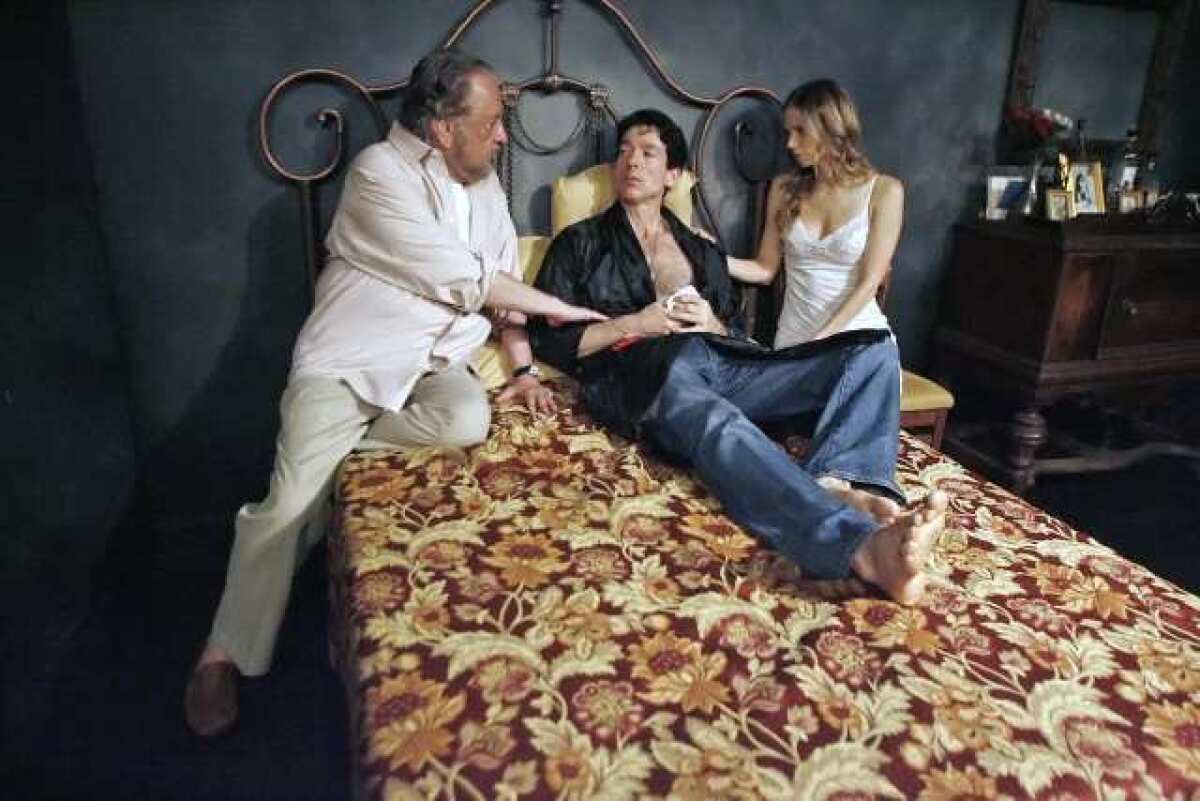Theatre review: Sidewalk Studio stirs up playwright’s conflicted history

The summer heat permeates a New York hotel room, circa 1972. A slim and sexy blond, clad only in a lacy white slip, lifts a languid hand to fan herself as she needles and nags the room’s other occupant: playwright Tennessee Williams.
In Joe Besecker’s poignant and steamy drama, “Tennessee in Summer,” at the Sidewalk Studio Theatre in Burbank, the Pulitzer Prize-winning author of “Streetcar Named Desire” and “Cat on a Hot Tin Roof” answers the young woman’s gibes in kind as he sits at his typewriter, struggling to finish a new play.
Crumpled pages littering the floor around his desk and the liquor and pills on a nearby cabinet attest to Williams’ frustration and angst.
“The critics have already written your obituary,” the woman taunts him, aware that Williams is obsessed with thoughts that his success is behind him. The critics, he howls back, turned against him when he publicly acknowledged his homosexuality.
After the woman goads the playwright into escalating bursts of rage, she seduces him away from his work with an anonymous male hustler whom she invites into the room. (This is an adults-only play, not only for its intense subject matter, but for some frank sexual grapplings and adult language.)
The action progresses in a series of non-linear time slips: The young, pre-college Williams is at home, telling his plans for the future to his beloved, damaged sister Rose (the inspiration for Laura in Williams’ strongly autobiographical drama, “The Glass Menagerie”).
During a party in 1947, Williams meets Frank Merlo, who would become his companion for 14 years; snippets of the turbulent years of their relationship occur en route to Merlo’s death from lung cancer.
Williams’ puritanical mother Edwina, who calls her son’s work “lunatic filth” and refuses to accept that she was the model for “The Glass Menagerie’s” smothering Amanda, appears at age 90, suffering from paranoid dementia.
And over the course of the play, Williams’ descent into a fog of pills and alcohol is painfully depicted, as is his hellish, involuntary commitment to a mental institution.
Throughout, the young woman, embodying the playwright’s conflicted feminine side, his self-doubt and self-loathing — and resembling a composite of female characters in Williams’ plays — castigates him about his drunkenness and “blue devil” tempers, and sneers at his determination to “live out this myth of the doomed artist.”
Yet underneath all of the unsettling verbal warfare — broken now and then by humorous exchanges and a softening between the two — is a sense of the playwright’s profound need for human connection and his inability to accept it, making the play’s gut-wrenching conclusion all the more powerful.
This dark portrait of an artist haunted by the past and tormented by the critical rejection and box-office failure that followed a long period of great triumph is one heck of an emotional ride; in the wrong hands, it easily could devolve into bathos. Sal Romeo’s taut direction and a sterling four-member cast, however, deliver the goods with unflinching honesty.
Notable as larger-than-life Williams, theater veteran Jack Heller reveals the acute vulnerability beneath the playwright’s selfishness, roar and bluster. Tamara Braun, best known for her daytime television roles, matches Heller every step of the way as Williams’ female counterpart. The pair’s tour-de-force performances are intensified further by the intimacy of the small, black-box theater.
Two outstanding actors round out the cast in multiple roles: Robert Standley as the sexy hustler, caring “Frankie” and unsympathetic brother Dakin; and Louise Davis as fragile sister Rose, nightmare mother Edwina and an officious nurse.
Richard Montes’ sound design frames the action with subtle ambient sounds of city traffic and evocative recorded music. Lacey Anzelc’s hotel room set design, hinting at summer heat and dissipation, is deepened by light designer Paige Selene Luke.
LYNNE HEFFLEY writes about theater and culture for Marquee.
“Tennessee in Summer,” Sidewalk Studio Theatre, 4150 Riverside Drive, Burbank. 8 p.m. Friday-Saturday, 3 p.m. Sunday. Ends May 20. $20. (800) 838-3006. www.brownpapertickets.com.